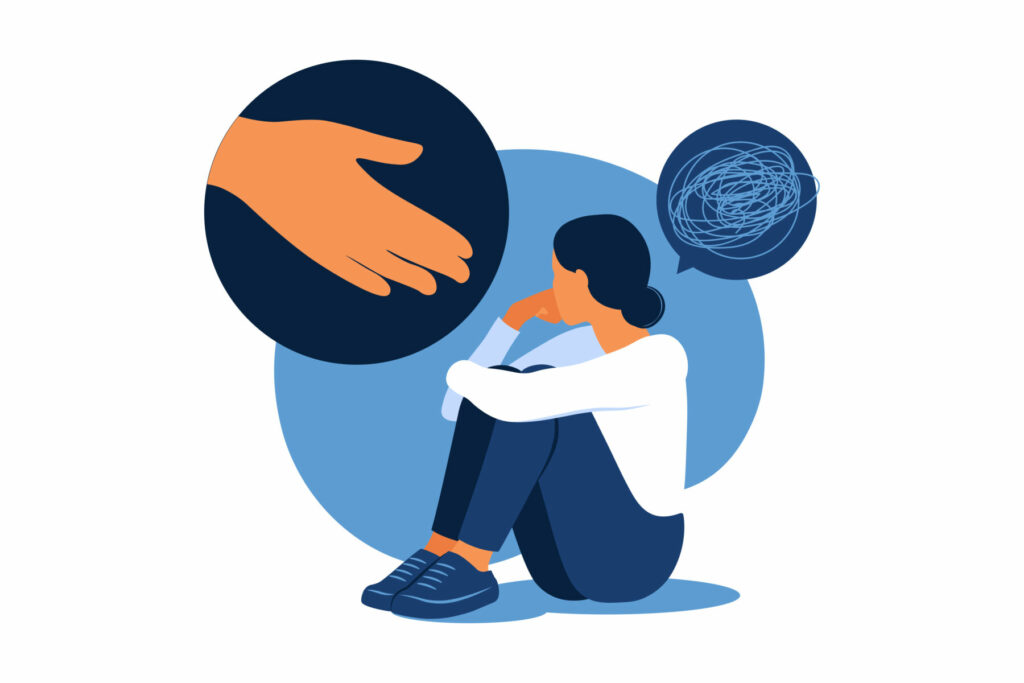Gain control of your life with counselling for anxiety support today
Wiki Article
Discovering Different Approaches in Coaching for Anxiousness Condition for Enduring Adjustment
When tackling anxiety conditions, it's necessary to check out a range of therapy approaches. Each method uses distinct insights and tools to help you handle your symptoms successfully. You might find that incorporating strategies can generate the very best outcomes. However, comprehending the subtleties of these methods is key to cultivating long-term change. What happens if the ideal combination could release a brand-new degree of psychological wellness for you?Comprehending Anxiety Problems: A Quick Summary
Anxiousness conditions, which affect numerous individuals worldwide, can significantly impact every day life. You might experience overwhelming sensations of worry or fret that appear irrepressible. These sensations can lead to physical symptoms like a racing heart, sweating, or also wooziness. Common kinds of anxiousness problems include generalised anxiety condition, panic attack, and social anxiousness problem. Each has unique indications, however they all share a tendency to interrupt your routine and relationships.Understanding the source of your stress and anxiety is important. It may come from genes, mind chemistry, or life experiences. Identifying your triggers can aid you manage your feedbacks much better. It is necessary to bear in mind that you're not alone in this struggle. Many individuals face comparable difficulties, and looking for assistance is a strong action towards sensation better. By discovering anxiousness problems, you're already on the course to understanding and handling your problem better.Cognitive-Behavioral Therapy: Challenging Adverse Thought Patterns
In Cognitive-Behavioral Treatment, you'll start by determining the adverse thought triggers that contribute to your anxiousness. Counseling services for anxiety. Once you recognize these ideas, you'll service changing them with even more positive alternatives. With each other, you'll construct reliable coping techniques to aid handle your stress and anxiety in daily circumstances
Identifying Negative Idea Triggers
When you experience minutes of distress, acknowledging the particular triggers behind your negative thoughts can be necessary in managing stress and anxiety. Start by focusing on circumstances that prompt feelings of fear or concern. Is it a crowded room, an upcoming deadline, or a discussion with certain people? Write down these circumstances in a journal. This will certainly help you identify patterns in your thinking. Notice physical sensations that accompany your adverse ideas, like a racing heart or tightness in your breast. By determining these triggers, you get understanding into what's sustaining your anxiety. Recognizing these connections is the first step in testing those thoughts and inevitably restoring control over your emotional reactions.Replacing Thoughts With Positives
Challenging adverse thought patterns is a necessary action in changing your mindset and reducing stress and anxiety. You might usually discover on your own caught in cycles of self-doubt or catastrophic reasoning. Rather of letting these thoughts determine your sensations, method replacing them with favorable affirmations or realistic alternatives. When you think, "I can not handle this," move it to, "I can handle difficulties one step at a time." This simple adjustment can significantly impact your psychological state. Frequently identifying and responding to these adverse thoughts assists create a much healthier inner discussion. Bear in mind, it takes some time and initiative, yet continually exercising this strategy can lead to long-term change, equipping you to deal with anxiety with renewed self-confidence and resilience.Structure Coping Methods Together

Mindfulness and Acceptance-Based Approaches: Cultivating Present-Moment Understanding
As you browse the complexities of anxiousness, integrating mindfulness and acceptance-based techniques can substantially enhance your capability to grow present-moment awareness. By focusing on the present moment, you'll discover that you can observe your thoughts and sensations without judgment. This practice helps you acknowledge your anxiousness without feeling overwhelmed by it.Engaging in mindfulness exercises, such as deep breathing, body scans, or guided meditations, enables you to ground on your own in your present experience. Acceptance-based approaches encourage you to accept your feelings instead of battle versus them. When you approve your sensations, they lose their power over you.Incorporating these practices into your everyday routine can transform how you react to anxiousness. You'll establish durability and find out to browse difficult circumstances with higher ease. Inevitably, cultivating present-moment recognition lays the foundation for long-term adjustment, equipping you to lead an extra satisfying life.Exposure Therapy: Facing Anxieties Slowly
Exposure treatment aids you face your fears in a steady way, making it much less overwhelming. You'll learn methods to deal with anxiety-provoking situations detailed, while also constructing coping approaches to manage your responses (Counseling services for anxiety). This approach empowers you to take control and decrease anxiousness over timeProgressive Exposure Methods
When dealing with anxiety, slowly confronting your worries can be a powerful method to regain control. This technique, referred to as progressive direct exposure, involves gradually exposing yourself to the scenarios or objects that cause your stress and anxiety. Beginning with less intimidating circumstances and slowly work your way up to even more difficult ones. For example, if you're worried of public speaking, you could begin by talking before a mirror, then proceed to sharing thoughts with a good friend, and at some point address a little group. Each step assists desensitize you to the fear, constructing your self-confidence gradually. Bear in mind, it's vital to pace yourself and commemorate tiny victories as you relocate via this procedure, enhancing your capability to handle anxiousness efficiently.Structure Coping Strategies
Structure effective coping approaches is necessary for handling anxiety, particularly as you face your fears slowly. One powerful method is exposure treatment, where you begin by facing your fears in a regulated way. Start with much less intimidating scenarios and slowly function your way as much as more challenging situations. This progressive exposure assists desensitize you to anxiety triggers, making them less overwhelming.Incorporate leisure methods, such as deep breathing or mindfulness, to calm your mind throughout exposure. Track your development, commemorating tiny triumphes in the process to increase your confidence. Remember, it's okay to take your time; the objective isn't excellence however consistent improvement. By building these approaches, you'll empower yourself to navigate anxiety and embrace life a lot more completely.Psychodynamic Therapy: Uncovering Source of Anxiety
Psychodynamic treatment discovers the subconscious mind, revealing the origin triggers of your stress and anxiety. By examining your ideas, sensations, and previous experiences, this strategy aids you reveal underlying conflicts and unresolved issues that may add to your existing stress and anxiety. You'll collaborate with a therapist to examine childhood experiences, relationships, and emotional patterns that shape your responses today.As you get insight into these deeper layers of your subconscious, you'll begin to acknowledge how past occasions affect your existing actions. This understanding can result in catharsis, allowing you to refine feelings you could have suppressed.Through the restorative partnership, you can also recognize defense reaction that may have created over time, providing a more clear course to alter. Ultimately, psychodynamic treatment furnishes you with the tools to address your anxiety at its core, advertising enduring change in your emotional well-being.Holistic and integrative Strategies: Integrating Methods for Greater Efficacy
Integrating different restorative strategies can improve your journey towards managing anxiety a lot more successfully (Counseling services for anxiety). By incorporating aspects from cognitive-behavioral therapy, mindfulness techniques, and holistic approaches, you can develop an individualized method that addresses your one-of-a-kind needs. You might make use of cognitive-behavioral strategies to test adverse thought patterns while incorporating mindfulness exercises to ground on your own in the existing moment.Additionally, discovering alternative techniques such as yoga exercise or reflection can promote relaxation and lower stress and anxiety signs. This blend allows you to create better self-awareness and resilience.Experimenting with these diverse methods can assist you uncover what reverberates most with you. Bear in mind, it has to do with locating a harmony that works, instead than staying with a solitary approach. This integrative method not only supplies prompt alleviation yet additionally promotes lasting abilities for taking care of anxiousness, empowering you to recover control over your life
The Function of Support Systems: Structure Strength Through Connection
While it might appear that managing anxiousness is a solitary trip, having a strong support group can play an important role in your durability. Surrounding yourself with compassionate pals, family members, or assistance teams develops a safe area where you can openly share your experiences and feelings. You remind yourself that you're not alone in this struggle.These relationships provide inspiration and can provide practical coping approaches that have actually functioned for others when you connect with others. It's additionally an opportunity to gain point of view; pals can help you see situations differently, minimizing feelings of isolation.Moreover, emotional support fosters a feeling of belonging, which can considerably relieve anxiety signs. By leaning on your support group, you can construct strength and take on obstacles better. Keep in mind, getting to out for assistance signifies strength, and it can make all the distinction in your trip toward handling stress and anxiety.Frequently Asked Inquiries

What Are the Common Symptoms of Anxiety Conditions?
You might experience restlessness, tiredness, problem focusing, irritation, muscle tension, and sleep disruptions. Physical signs can include fast heartbeat, sweating, and shivering. Recognizing these indicators early can help you look for appropriate support and treatment.Exactly How Long Does Treatment Typically Last for Stress And Anxiety Conditions?
Treatment for anxiousness disorders commonly lasts anywhere from a couple of weeks to numerous months. It actually depends on your specific requirements, progression, and the techniques your therapist utilizes to assist you manage your anxiety successfully.Can Drug Be Utilized Together With Therapy for Anxiety?
Yes, medicine can certainly be used along with treatment for anxiety. Combining both strategies usually boosts therapy performance, aiding you take care of symptoms while checking out underlying issues through counseling. Always consult your medical care service provider for individualized guidance.Exist Self-Help Strategies for Taking Care Of Anxiety?
Yes, there are numerous self-help approaches for managing stress and anxiety. You can exercise mindfulness, take part in normal workout, keep a balanced diet, develop a routine, and utilize deep breathing methods to help in reducing anxiousness symptoms efficiently.Just how Do I Know if I Required Specialist Assistance for Anxiousness?
You must think about seeking websites professional aid for anxiety if it disrupts every day life, creates considerable distress, or if self-help approaches aren't functioning. Depend on your instincts; connecting can result in better coping skills and support. Usual types of anxiety conditions consist of generalised anxiety condition, panic problem, and social anxiousness condition. When you experience moments of distress, acknowledging the specific triggers behind your negative thoughts can be essential in taking care of anxiety. Replacing adverse thoughts is just the start of managing anxiousness successfully. By examining your ideas, sensations, and previous experiences, this strategy helps you reveal underlying problems and unsolved issues that may contribute to your present anxiousness. It's likewise a chance to get perspective; good friends can help you see situations in different ways, decreasing sensations of isolation.Moreover, psychological support cultivates a sense of belonging, which can significantly relieve stress and anxiety signs.Report this wiki page